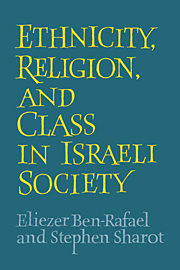Book contents
- Frontmatter
- Contents
- Acknowledgments
- I Theoretical and empirical background
- 1 Ethnicity and society
- 2 Divisions in Israeli society
- 3 Theoretical perspectives in Israeli sociology
- 4 The sample, its background, and its setting
- II Social patterns and behavior
- III Identities and images
- IV The impact of stratification
- V Social cleavages: an overview of Israeli society and some theoretical implications
- Appendix A The sample
- Appendix B Deprivation index
- Appendix C Indexes of ethnic identification
- Glossary
- Notes
- References
- Index
3 - Theoretical perspectives in Israeli sociology
Published online by Cambridge University Press: 12 September 2009
- Frontmatter
- Contents
- Acknowledgments
- I Theoretical and empirical background
- 1 Ethnicity and society
- 2 Divisions in Israeli society
- 3 Theoretical perspectives in Israeli sociology
- 4 The sample, its background, and its setting
- II Social patterns and behavior
- III Identities and images
- IV The impact of stratification
- V Social cleavages: an overview of Israeli society and some theoretical implications
- Appendix A The sample
- Appendix B Deprivation index
- Appendix C Indexes of ethnic identification
- Glossary
- Notes
- References
- Index
Summary
A major focus of sociology in Israel has been ethnic differences and assimilation within the Israeli-Jewish population. Almost all studies investigating inequality or the class structure have dealt with ethnicity, and the same is true of studies on religiosity. Publications on ethnic differences and ethnicity among Jews (Smooha, 1987) have far outnumbered those on other important research topics such as the Arab minority and religion in Israel. This focus is understandable given the basic assumption among Israeli Jews that Israel is first and foremost a Jewish state, and the dominant ideology of the “ingathering” and “merging” of Jews from different parts of the world. Much of the theoretical debate on ethnicity in Israel has revolved around the question of the distance between the ideology of ethnic amalgamation and the ethnic reality. This has not always been an explicit issue, but it provides an important part of the background of the differences among the theoretical perspectives to be outlined below.
The four general perspectives on ethnicity outlined in the first chapter have had their Israeli representatives, and they have appeared roughly in that order: the perspectives focusing on ethnic adaptation and socio-psychological aspects were followed by a conflictual pluralistic approach, and then by a perspective which emphasized the class basis of ethnic differences.
- Type
- Chapter
- Information
- Ethnicity, Religion and Class in Israeli Society , pp. 36 - 53Publisher: Cambridge University PressPrint publication year: 1991



